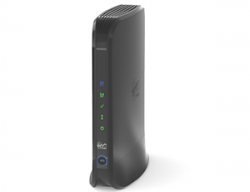Virgin Media UK SuperHub Leaks User Passwords via WiFi During Reboot

The NetGear-based SuperHub (VMDG485) broadband routers, which are supplied by cable provider Virgin Media, appear to be suffering from a new security flaw that means your administrative settings web page and WiFi passphrase is left exposed for around 7 seconds when the device reboots.
The flaw, which was spotted by IT consultant Paul Moore, apparently occurs because some bright spark of security genius decided that it would be a clever idea if the router initially launched its wireless networking component (during a reboot) without first engaging encryption (the encryption is only enabled after a few seconds).
Advertisement
In other words, for a very brief period, a savvy hacker could potentially record your wifi password while it is being sent over the network during the initial restart. However the hacker would naturally need to be within range of the wireless network to do this and, unless they’re very patient, they’d also need to artificially force the router to reboot (Mr Moore has also demonstrated how to do this).
A VM Forum Support Team Member said (here):
“As mentioned earlier on in this thread, the security of our services is of the highest importance and we are working with Netgear to develop and test a software update which will initialise encryption immediately from reboot and this is close to being issued.
We encourage all our customers to change their default passwords when they are installed, if anyone is unsure whether they have made this change, instructions on our website provide an easy guide on how this can be done at any time on our help pages at http://virg.in/sh2pass
If customers are concerned, then we would recommend that after changing the default password, they should also change the WiFi passphrase for additional security.
To confirm, the issue only relates to the Netgear VMDG485 device (SuperHub2) and, although we agree with the person who identified it that this is highly unlikely to happen; we have thanked them for bringing this to our attention.”
So the good news is changing the default password, which is something that Virgin and other ISPs recommend you do anyway, is a good temporary fix for the problem. Credits to The Register for spotting this issue, which can be added to the growing list of router related security blunders that seem to be cropping up in 2014.
Mark is a professional technology writer, IT consultant and computer engineer from Dorset (England), he also founded ISPreview in 1999 and enjoys analysing the latest telecoms and broadband developments. Find me on X (Twitter), Mastodon, Facebook, BlueSky, Threads.net and Linkedin.
« Is it the ISPs Fault if Your Home Broadband Router Gets Hacked?




















































Comments are closed